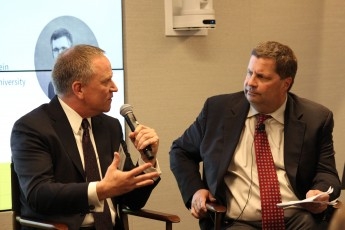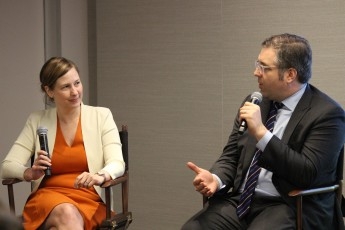
ICFJ's Patrick Butler (left) tells moderator Dave Callaway, CEO of TheStreet, that U.S. media should form partnerships with international investigative news groups.
We are engaged in an information “arms race,” as misinformation challenges quality news in astonishing ways, according to an ICFJ panel in Boston on The Case for Global Media Collaboration in a Fragmenting World.
“Global misinformation is a staggering trend in its scope and intensity,” said Nicco Mele, director of the Shorenstein Center at Harvard University. According to his study, 25 percent to 50 percent of content shared on social media is “misinformed.” During the French elections, 18 nations, including the United States, produced fake content “designed to misinform the French public,” he said.
This comes at a time when many mainstream U.S. news organizations, struggling to stay afloat, have cut back on the numbers of overseas bureaus, noted Philip Balboni, chairman, CEO and co-executive editor of the DailyChatter. Nevertheless, “the mainstream media need to play a more important role in covering the world,” he said.

Shorenstein's Mele (right) said "global misinformation is a staggering trend in its scope and intensity."
One way to cope with the challenges is for U.S. media to forge collaborations with investigative news networks that have sprung up around the world. Many of these groups have participated in the Pulitzer-Prize-winning Panama Papers project—and they are seeking alliances, said ICFJ Vice President Patrick Butler.
Kathleen Kingsbury, the Boston Globe’s Managing Editor for Digital, said that she has worked with non-profit journalism groups in the United States such as ProPublica and the Pulitzer Center for Crisis Reporting to cover the scope of hate crimes in her city—and around the country. “We are trying to find partnerships,” she said.
Another way to counteract “fake news” is by supporting international fact-checking organizations, said Butler. Chequeado, a group in Argentina, for example, has spearheaded innovative ways to expose false claims. “We can learn a lot from what’s happening around the world,” he said. He added that ICFJ has launched a contest called TruthBuzz to find ways to make the truth go viral.
In addition, the “success of Russia sowing chaos in the U.S. election has not gone unnoticed,” said Shorenstein’s Mele. He said 37 newsrooms in France pooled resources to identify fake news and “stop it in its tracks.” Now, there are studies to determine what worked in advance of elections in the United Kingdom and the United States.
So, are we losing the “arms race”? “If we are winning, it feels pretty bad now,” said moderator Dave Callaway, CEO of TheStreet and an ICFJ Director. But Balboni noted that “there is an increase in support for quality journalism since the U.S. elections. People have rediscovered the value of good journalism, its role in democracy, and that it is not to be taken for granted.”
As Balboni said, “this is just a moment in time and there will be better ones.”